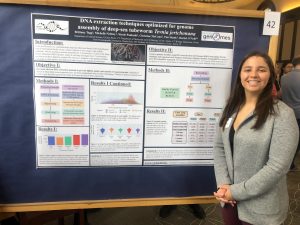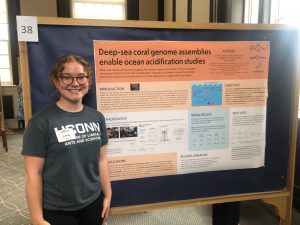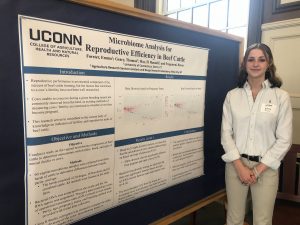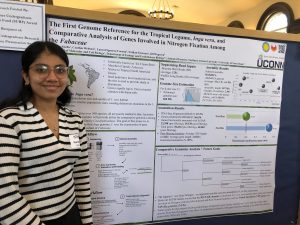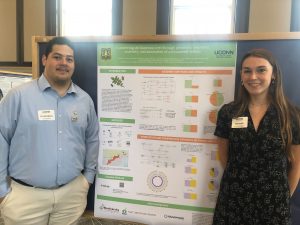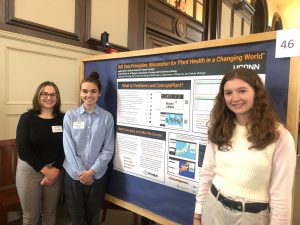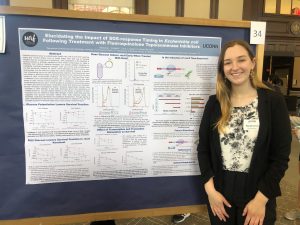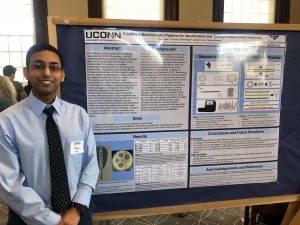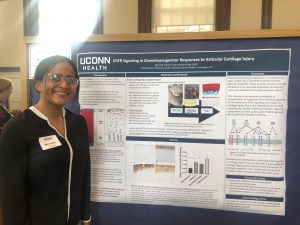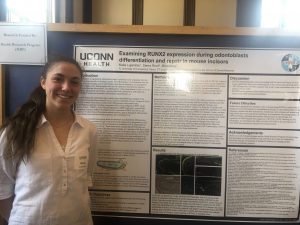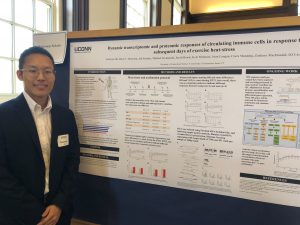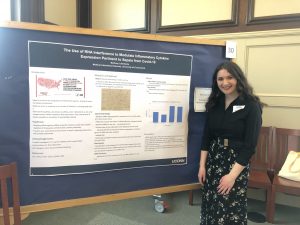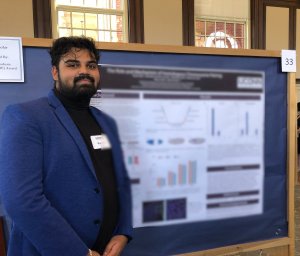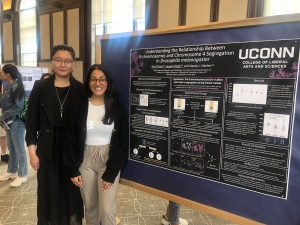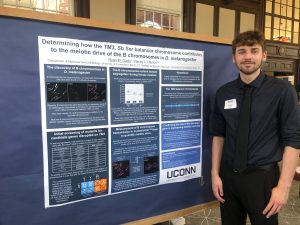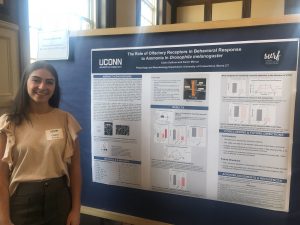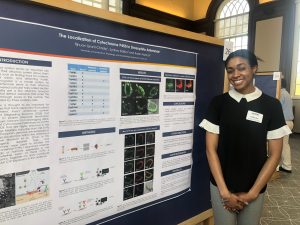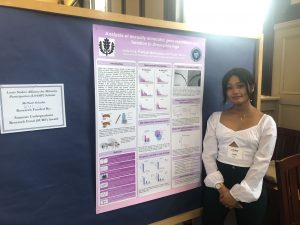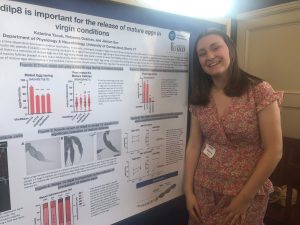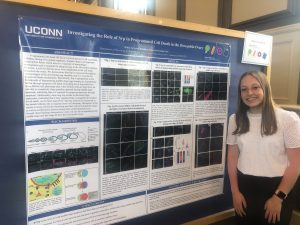FOLLOW THIS LINK FOR THE FULL ARTICLE FROM UCONN TODAY.
By Jaclyn Severance
A team of researchers at UConn, in collaboration with Carlos Santibanez-Lopez at Western Connecticut State University, have generated the first chromosome-level genome of the desert hairy scorpion – an iconic inhabitant of the Mojave and Sonoran deserts of North America and the largest scorpion found on the continent.
While there are over 100,000 known species of arachnids, genomic research to date has predominately focused on two groups – spiders and ticks – and genomic research into scorpions has primarily involved the large Buthidae family.
The UConn team’s work with Hadrurus arizonensis – a solitary and nocturnal arachnid that can grow up to six inches in length – details the first genome assembled and annotated for a species in the smaller Hadruridae family of scorpions.
Their work is also the first chromosome-level genome assembly of any scorpion from either family – helping to fill a crucial gap in the genomic knowledge of scorpions, shedding light on the evolutionary development and diversification of arachnids, and advancing studies in comparative and functional genomics.
The team published their work in the May 2024 edition of the journal Genome Biology and Evolution.
But perhaps just as remarkable as the publication of this first-of-its-kind genomic research is the research team itself – a diverse group of scholars in an intensive postbaccalaureate program who’ve spent the last year in Storrs getting a crash course in hands-on skills while each working to find their own place in the research world.
‘Diverse Experiences’
While each of the eight scholars in the first cohort of UConn’s National Science Foundation supported Research and Mentoring for Postbaccalaureates program, or RaMP, has their own unique interests, they share similar reasons for why they wanted to join the program after they completed their undergraduate studies – some at UConn and some elsewhere – in the spring of 2023.
Jennifer Santiago Membreño and Aviel Rodriguez each graduated from the University of Puerto Rico, where massive disruptions caused by Hurricane Maria and the COVID-19 pandemic limited their ability to gain valuable research experience as undergrads.
“It was a pretty tumultuous time,” says Santiago Membreño. “Life was continuously being paused.”
Samuel Pring, who attended Bucknell University, found an interest in RNA research, but had fewer opportunities to take classes and expand his research efforts at his small college in Pennsylvania.
Like many undergraduate students, Adam Glendening ’23 (CLAS) and Carolina Jara ’23 (CLAS) both had to work while also going to school, leaving them less time to take on research and independent projects.
“After graduation, it turns out a lot of places don’t take landscaping as fieldwork experience,” Glendening says.
Samuel Hilliman ’23 (CLAS) gained an interest in research while studying at UConn, but didn’t get the hands-on experience needed to develop his own interests.
Meridia Jane Bryant, who graduated from the University of Kansas, found that her life and research interests changed after she transitioned while an undergraduate – she wanted to shift gears and focus more on bioinformatics, but didn’t have the experience to do so.
When Asher Coello ’23 (CLAS) changed to UConn Storrs from a regional campus, he struggled to make inroads into the research community.
“I’ve always just been in the books,” Coello says. “I’ve never actually been in the lab doing stuff.”
Their stories are familiar to Elizabeth Jockusch, a professor in UConn’s Department of Ecology and Evolutionary Biology and the principal investigator and lead mentor for RaMP at UConn.
“We’re at a Research 1 university,” Jockusch says. “There are research opportunities here. And yet, we see how many students can’t take advantage of them, so it’s clear that there’s this huge need.
“The reason that the program appealed to me – the reason that we brought everyone together and wrote the grant – is that, essentially, we see the need in our students.”
In 2022, Jockusch and a team of faculty collaborators received that grant – for just under $3 million – from the National Science Foundation RaMP in Biological Sciences program, which invites proposal submissions to establish networks that support full-time research, mentoring, and training for recent college graduates who have had few or no research or training opportunities during college.
Part of the NSF funding program’s goal is to support a globally competitive and culturally diverse STEM workforce by recruiting and training individuals for a range of potential career pathways in biological sciences.
“This is maybe an exaggeration, but it feels like kind of a last chance to hook people into the STEM pipeline of education,” Jockusch says. “If you graduate and your field experience is landscaping, because that’s how you were paying the bills, it’s much harder to get that kind of job. So instead, you can come here, you have a year where you get these diverse experiences, and then you can go on.”
Prior laboratory experience is not a requirement for RaMP scholars, and the NSF grant will ultimately support three consecutive year-long RaMP cohorts at UConn.
‘The Baby Swims’
The first eight scholars began their work in August 2023 – and there was no period of adjustment or easing into the program.
“My favorite allegory that I keep using is that I feel like one of the babies at the YMCA that they just throw into the pool,” says Coello. “Because it looks very scary, and it probably is in the moment. But, the baby swims.”
Within the first month of the RaMP program, the cohort had successfully assembled their first set of DNA sequences.
They quickly learned how to handle specimens and extract DNA. They learned how to conduct high throughput sequencing and assemble genomes. They learned how to annotate a genome, finding the locations of individual genes. They got a crash course on bioinformatics, a discipline that melds biology and computer science.
Alongside their newfound lab skills, the scholars learned soft skills critical to their future success in research. They learned about time management, prioritizing tasks and workloads, taking copious notes, and the importance of networking.
And they launched their own projects in affiliated faculty labs as well as on the group project sequencing the scorpion genome.
Hilliman and Pring both work in the Yuan Lab, where Pring is researching the evolution of flower structures, specifically how bilateral flower symmetry has evolved, and Hilliman is working to manipulate flower pigmentation using genetic engineering.
In Jockusch’s lab, Coello is working on genetic novelty in the giant milkweed bug, Oncopeltus fasciatus – trying to turn off certain genes to see what it does and how it might be genetically significant – and Bryant is building a program to help identify novel genes.
“Those genes that kind of originated at whatever group you’re interested in – looking at making a program to help people find those, that way they can do their own research on what they are and what they’re doing, without needing to go through all the bioinformatic steps to find them in the first place,” Bryant says. “Because there really isn’t anything that does that.”
In the Wegrzyn Lab, Jara is studying disease resistance in two tree species – American beech and butternut – while Glendening is working on a project on hemlock wooly adelgid, an invasive pest impacting hemlock trees.
Santiago Membreño’s work in the Kanadia Lab involves understanding the role of the minor spliceosome.
And in the O’Neill Lab, Rodriguez is studying chromosomes and assembling genomes, particularly for the muntjac, a species of deer, and the wallaby, a small marsupial similar to the kangaroo.
Less than a year after being thrown into the deep end of the pool, the scholars are all swimming.
‘From Zero’
Less than three months after submitting their paper on the desert hairy scorpion’s genome assembly, the paper was not only accepted, but also published.
“Once this actually took off, and we published, and it was accepted so quickly, I was like, ‘Whoa!’” says Coello.
“I called my mom,” says Glendening.
“We just happened to write a fantastic paper,” says Bryant.
The cohort is currently working on a second, longer paper as they near the end of their one-year program in July. As they’ve each learned new skills through their individual projects, they’ve each brought new expertise to their group work – a change that their mentors have seen since the start of the program.
“At the beginning, it’s like everyone was trying to do their own thing,” says Jockusch, “and now, I see them helping to solve each other’s problems a lot.”
“It started with the mentors talking, us showing things, and now they are doing it,” says Jill Wegrzyn, an associate professor of ecology and evolutionary biology and a mentor in the RaMP program. “It’s incredibly rewarding to see people learn so much in a year, and that’s something I really enjoy as part of the program. It’s just really cool to watch the project progress from the lab to fairly complex bioinformatics to get these genomes put together.
“We’ve had a lot of fun.”
While most of the cohort is still working out what their next steps will be after RaMP, the experience has helped open doors that might have otherwise seemed closed when they completed their undergraduate studies.
“For our project, we were all there from zero to where we are now,” says Pring. “We really got a feel for what each part of this whole process looks like – from getting the DNA onto the sequencer to assembling the genome. For me, it was nice to see what every step looks like, and especially when we’re at that stage where we’re trying to find out which path we want to take.
“Having the whole experience really helps to shape what I want to take on.”
The second UConn RaMP cohort – comprised of 11 new scholars – begins in August.
